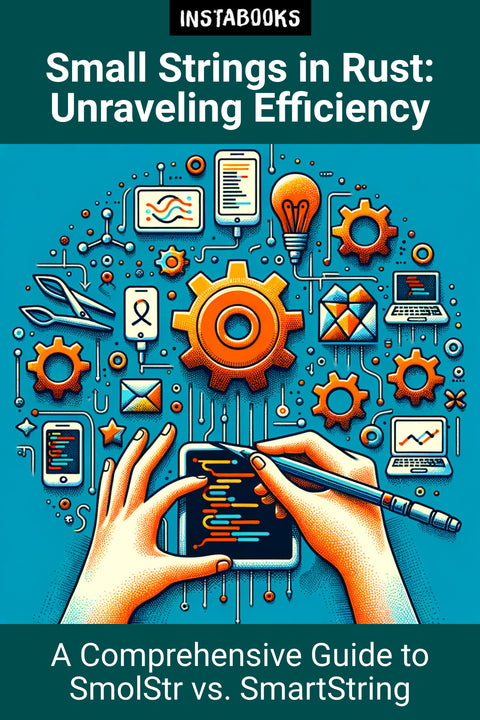
Small Strings in Rust: Unraveling Efficiency
A Comprehensive Guide to SmolStr vs. SmartString
Included:
✓ 200+ Page AI-Generated Book
✓ ePub eBook File — read on Kindle & Apple Books
✓ PDF Print File (Easy Printing)
✓ Word DOCX File (Easy Editing)
✓ Hi-Res Print-Ready Book Cover (No Logo Watermark)
✓ Full Commercial Use Rights — keep 100% of royalties
✓ Publish under your own Author Name
✓ Sell on Amazon KDP, IngramSpark, Lulu, Blurb & Gumroad to millions of readers worldwide
Introduction to Small Strings in Rust
In the world of Rust, efficiently managing small strings is paramount for both performance and memory optimization. As developers push the boundaries of software capability, two specialized crates, SmolStr and SmartString, have emerged to address the nuances of small string handling. This book aims to provide an in-depth exploration of these two crates, comparing their features, use cases, and performance optimizations.
Delving into Features
Understanding the distinct capabilities of SmolStr and SmartString is essential for making informed decisions in your projects. SmolStr, known for its inline string capacity of up to 22 bytes, excels in scenarios requiring stream-friendly operations. It’s immutable, further enhancing its efficiency in memory usage and cloning. Conversely, SmartString, with its 23-byte inline capacity, offers mutability, allowing for enhanced flexibility. Its strength lies in cache locality optimization, making it ideal for data structures like B-trees. Additionally, SmartString supports serialization and deserialization through Serde, which is pivotal for applications requiring data persistence.
Exploring Use Cases
For practical applications, understanding where each crate shines is crucial. SmolStr has found its niche within Rust Analyzer, being the tool of choice for token storage due to its simplicity and efficiency. It’s suited for contexts where small strings play a pivotal role but are not the sole focus. On the other hand, SmartString demonstrates its prowess in being a key player in B-tree structures, significantly boosting performance through enhanced cache locality. It's also apt for JSON deserialization tasks where handling small strings efficiently is crucial.
Unpacking Performance Optimizations
Performance is a critical aspect woven through the capabilities of both crates. SmolStr, with its efficient memory and cloning operations, stands out in applications where these properties are a priority. However, SmartString’s design which enhances cache locality offers a notable advantage in complex data structures requiring rapid access and manipulation. By inlining slightly longer strings, SmartString can indeed offer better performance under specific conditions.
Conclusion
This comprehensive guide sheds light on the intricate details of SmolStr and SmartString in the Rust programming environment. With a focus on practicality, efficiency, and the unique strengths of each crate, this book encourages developers to assess their specific project needs and apply the most suitable tool. By mastering these small string strategies, developers can enhance their Rust programming proficiency and optimize application performance to new heights.
Table of Contents
1. Introduction to Small Strings- Why Small Strings Matter
- Overview of Rust's String Handling
- SmolStr and SmartString's Relevance
2. Features of SmolStr
- Inlined String Capabilities
- Stream-Friendly Design
- Memory Efficiency Benefits
3. Features of SmartString
- Enhanced Mutability
- Cache Locality Advantages
- Serialization Support with Serde
4. Use Cases for SmolStr
- Role in Rust Analyzer
- Efficient Token Storage
- General Application Scenarios
5. Use Cases for SmartString
- B-trees and Data Structures
- Optimized JSON Handling
- Real-World Examples
6. Performance Optimization Techniques
- Memory Allocation Strategies
- Efficiency in Practice
- Comparative Performance Insights
7. Memory Management in Rust
- Understanding Rust's Ownership Model
- Efficient Use of Small Strings
- Error Handling with Strings
8. Advanced String Handling Techniques
- Beyond Inline Strings
- Integrating with Rust Libraries
- Best Practices and Pitfalls
9. Case Studies and Examples
- Successful Implementations
- Lessons Learned
- Future Prospects
10. Community and Ecosystem
- Open Source Contributions
- Community Feedback and Insights
- Staying Updated
11. Future of Small Strings in Rust
- Emerging Trends
- Ongoing Research and Development
- Industry Applications
12. Conclusion and Final Thoughts
- Summary of Key Points
- Choosing the Right Tool
- Steps Forward in Your Rust Journey
Target Audience
This book is written for Rust developers and programmers interested in optimizing small string handling for performance and memory efficiency.
Key Takeaways
- Comprehensive understanding of small string handling in Rust.
- Features and benefits of SmolStr and SmartString.
- Practical use cases and performance optimization techniques.
- Insights into memory management and efficiency.
- Guidance on selecting the right tool for specific applications.
